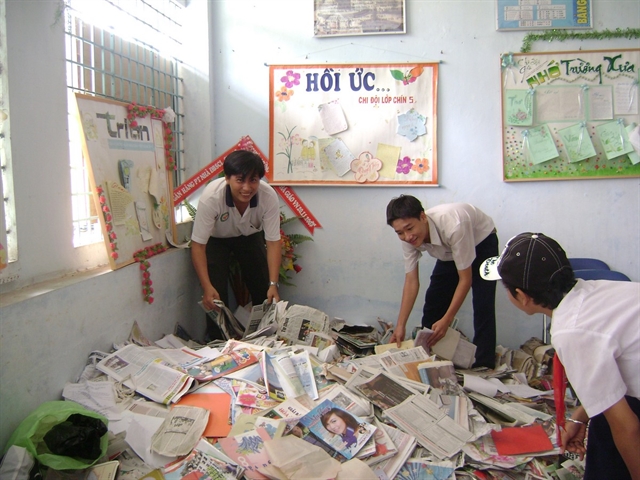 Society
Society

 |
| Students collect scrap papers and bring them to school as part of the 'Small Plans' campaign. — Photo danviet.vn |
HÀ NỘI — 'Small Plans' is a long-running campaign for children that encourages them to do good deeds according to their ability, the most popular one being collecting and sorting out discarded papers for recycling.
However, the relevance of the decade-long educational activity is being questioned in the modern era.
Initiated in 1958 by the Hồ Chí Minh Young Pioneer Organisation to fund a factory in Hải Phòng City, the campaign lasts to this day in schools and the organisation's chapters across the country.
It follows the late President Hồ Chí Minh's saying that 'people of small ages can do small things, according to their ability.'
Today, however, many parents question the campaign's relevance and whether it is now a school-based campaign with 'quotas' to be met.
Speaking to Dân Việt e-newspaper, education expert Dr Vũ Thu Hương said that Small Plans is a meaningful campaign that lets children learn two things; using things economically and efficiently, as well as sorting and recycling waste.
"However, many parents are now frustrated, thinking that the Small Plans campaign no longer has the same meaning and that the schools pose a nuisance to students.
"I have heard about parents buying discarded papers for their children to bring to school (as part of their submissions to the campaign), and that is deeply anti-educational," said Hương.
Saying that every task assigned by the school has its educational purpose, she believed that children would not be able to learn anything if parents kept pampering them.
Hương added: "Children's education needs coordination between the school and the family.
As a mother, Dr Hương also actively participated in the campaign with her young child.
"We had a big styrofoam box in the house. Throughout the school year, my child and the family would put every discarded piece of paper or notebook in the box.
"When it came time for submission for the campaign, the amount collected often exceeded the school's requirement."
The education expert believed that it is because people don't have an awareness of trash collecting and sorting that they think the digital era has no discarded paper.
"If parents are mindful of helping their children in this task, they can collect papers to submit with their children. I think parents should be more discerning on this matter."
Regarding some parents' concerns about where the money raised from this activity goes, Dr Hương said that depending on each location, that amount could be put into the class' fund or to support disadvantaged children.
She said: "I could say for certain that the amount collected from Small Plans is usually very small and not worth a concern."
However, the 'achievement disease', has admittedly distorted the original activity, Dr Hương said.
The important thing is not about the volume of what children collect but how they do it - only a few schools realise this to take the right actions, said the expert.
On the contrary, a parent in Hà Nội concerned about the activity's relevance said: "Teaching children about economic use, environment protection and recycling is good, but it is not necessarily about collecting trash and discarded paper just for 'achievements' as such."
Sharing the same perspective, Lê Thu Trang, a mother of two primary school students in the capital city, said that Small Plans should be ceased.
Then, families could sort out recyclable waste to give out to scrap collectors, allowing them to earn extra income.
She believed that in this way, children would both learn to protect the environment and be mindful of others instead of solely thinking of their submission to the school.
Trang added that in several private schools, students could organise a fair and think of the products they could sell, managing their stock and finance for the biggest profit, which would then be donated to fund.
Trang said this activity is more beneficial to children and fits the current context. — VNS




